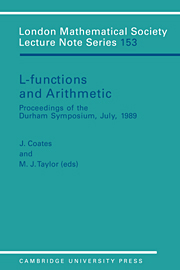Book contents
- Frontmatter
- Contents
- Preface
- Participants
- Lectures on automorphic L-functions
- Gauss sums and local constants for GL(N)
- L-functions and Galois modules
- Motivic p-adic L-functions
- The Beilinson conjectures
- Iwasawa theory for motives
- Kolyvagin's work for modular elliptic curves
- Index theory, potential theory, and the Riemann hypothesis
- Katz p-adic L-functions, congruence modules and deformation of Galois representations
- Kolyvagin's work on Shafarevich-Tate groups
- Arithmetic of diagonal quartic surfaces I
- On certain Artin L-Series
- The one-variable main conjecture for elliptic curves with complex multiplication
- Remarks on special values of L-functions
Motivic p-adic L-functions
Published online by Cambridge University Press: 18 December 2009
- Frontmatter
- Contents
- Preface
- Participants
- Lectures on automorphic L-functions
- Gauss sums and local constants for GL(N)
- L-functions and Galois modules
- Motivic p-adic L-functions
- The Beilinson conjectures
- Iwasawa theory for motives
- Kolyvagin's work for modular elliptic curves
- Index theory, potential theory, and the Riemann hypothesis
- Katz p-adic L-functions, congruence modules and deformation of Galois representations
- Kolyvagin's work on Shafarevich-Tate groups
- Arithmetic of diagonal quartic surfaces I
- On certain Artin L-Series
- The one-variable main conjecture for elliptic curves with complex multiplication
- Remarks on special values of L-functions
Summary
Introduction. The connexions between special values of L-functions and arithmetic is an ancient and mysterious theme in number theory, which can be traced through the work of Dirichlet, Kummer, Minkowski, Siegel, Tamagawa, Weil, Birch and Swinnerton-Dyer, Iwasawa, …. Recently, Bloch and Kato [1], using ideas which rely heavily on the work of Fontaine, have succeeded in formulating a very general version of the classical Tamagawa number conjecture for linear algebraic groups for arbitrary motives over the rational field Q, which seems to contain as special cases all earlier conjectures about these questions. Needless to say, only a very modest amount of progress has been made so far towards proving the Bloch-Kato conjecture for specific motives over Q (essentially, the only cases where it can be established at present are for the Tate motives, and certain motives arising from elliptic curves with complex multiplication). In all the cases where proofs are known, the conjecture is established for each prime p separately, and the deepest part of the argument involves ideas from Iwasawa theory. Specifically, one must use a version for the motive of the so called ‘main conjecture’ of Iwasawa theory, which has now been completely proven for the above motives (apart from the troublesome primes 2 and 3 in the case of elliptic curves with complex multiplication), thanks to the beautiful work of Mazur, Wiles, Thaine, Kolyvagin and Rubin (see the article by Rubin in this volume).
- Type
- Chapter
- Information
- L-Functions and Arithmetic , pp. 141 - 172Publisher: Cambridge University PressPrint publication year: 1991
- 10
- Cited by



